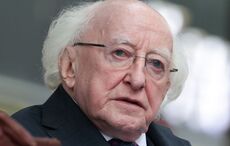On Thursday September 10, First Minister of Northern Ireland and leader of the Democratic Unionist Party (DUP), Peter Robinson, stepped aside from his position in Northern Ireland’s government.
His action was coupled with the resignation of all but one of the other DUP Ministers, leaving just Finance Minister Arlene Foster in government as Acting First Minister on Robinson’s command.
This escalation has been a final blow for Northern Ireland’s Stormont Executive, the governing body of Northern Ireland, that has been locked in a stalemate the past number of months due to issues surrounding its fiscal future and the possible continued existence of the IRA.
With Stormont now in disarray, Secretary of State for Northern Ireland Theresa Villiers has warned the House of Commons (British parliament) in London that if the dispute is not resolved, government in Northern Ireland will collapse and which will mostly likely mean a return to direct rule from London.
Here’s everything you need to know about the current crisis.
What are the main issues?
A stalemate has been in place in Stormont since March, with the failure of Sinn Féin to accept the Stormont House Agreement, a welfare reform bill previously agreed in December 2014.
Put forward by the DUP, the Stormont House Agreement (SHA) failed to pass through the assembly because of Sinn Féin’s refusal. Many felt Sinn Féin simply refused the bill in an attempt to stretch the anti-austerity image they hold in the Republic of Ireland to the North in the run-up to the UK election last May.
When the DUP once again failed to pass legislation to implement these welfare reforms in June, the threat arose that NI government departments could possibly run out of money.
DUP Finance Minister Arlene Foster was under pressure at the time to approve a budget. The DUP made it clear that they would not support a budget without the implementation of welfare changes outlined in SHA with Nationalist parties, in turn, stressing that they were not happy to implement them.
A stalemate has been in place ever since.
Adding to these welfare cut concerns, however, is the added issue of the resurgence of possible republican violence in NI and the claim of the Police Service of Northern Ireland Chief Constable George Hamilton that former or current IRA members were involved the recent death of ex-IRA man Kevin McGuigan.
McGuigan, a father of nine, was murdered in the Short Strand area of Belfast on August 12 in what is believed to have been a revenge killing for the earlier murder of leading IRA figure Jock Davison in an internal republican feud.
Although sixteen arrests have been made in relation to McGuigan’s death, Wednesday’s arrest of Sinn Féin Northern chairman Bobby Storey in connection with the murder, in particular, resulted in a wave of mistrust among the unionist and republican parties.
Storey is a senior figure in Sinn Féin (one of Stormont’s two largest parties along with the DUP) and is a man who Gerry Adams refers to as a friend. The possibility that Storey has been involved in recent IRA activity had serious implications for relations between the political parties.
Storey, however, was freed unconditionally with no charges making it a very strange arrest at a time of maximum tension indeed.
Despite Adams' and Sinn Féin's insistence that the IRA does not exist, on Wednesday Robinson threatened to leave government along with the other members of his party if the Northern Ireland Assembly was not adjourned until the murder case had been resolved.
On Thursday, when the DUP failed to achieve this, Robinson went through with his threat, leaving just Arlene Foster in place as Acting First Minister.
What is Stormont?
Stormont is the term often used to refer to Northern Ireland's government, the Northern Ireland Executive, because the government buildings are at Stormont in East Belfast.
The Northern Ireland Executive was established under the 1998 Good Friday Agreement and consists of a First Minister and a Deputy First Minister and various ministerial portfolios.
Who are the main players?
Theresa Villiers: The Northern Ireland Secretary of State is effectively Northern Ireland’s main link to parliament in Westminster as their representative in the cabinet. Her position also advances the British government's interests in Northern Ireland.
Peter Robinson: DUP leader. Although Robinson has stepped down as First Minister, he remains leader of the DUP and will be a key figure in upcoming talks.
Arlene Foster: DUP Finance Minister and Acting First Minister. Foster has essentially been left in Government by Robinson to ensure that no changes to the proposed welfare reform bill are made in the absence of other DUP ministers. Foster also played a key role in the welfare crisis before this as Finance Minister. Her role in drafting budgets means her input will be important in the talks.
Martin McGuinness: Deputy First Minister and Sinn Féin politician.
Gerry Adams: President of Sinn Féin. Adams has been prominent in defending Storey in recent days, stating that he believes he would have an early release, which is exactly what happened. Adams denies the IRA still exists.
Other important players.
Mike Nesbitt: Leader of the Ulster Unionist Party. NI’s other major unionist party left government last month, urging the DUP to do the same. In recent days, Nesbitt has called on Sinn Féin to admit to the existence of the IRA.
Bobby Storey: It may be too late for Storey’s innocence to prevent the current crisis as he was released from questioning just one day after his arrest.
David Cameron: British Prime Minister.
Enda Kenny: Taoiseach (Prime Minister) of the Irish government.
Charlie Flanagan: The Irish Minister for Foreign Affairs will work with Villiers on resolution talks in the North.
What is the Stormont House Agreement?
The SHA was established in December 2014 as a bill on economic reform in Northern Ireland as agreed between the Northern parties and the Irish and British governments. Although agreed on in 2014, Sinn Féin refused to pass the bill in March 2015 leading to the current stalemate.
Is this kind of thing common in Northern Ireland politics?
As with most government proceedings, political parties agree, disagree, work in alliance and work in opposition with each other, and Northern Ireland is no different in this respect. In fact, BBC’s Northern Ireland correspondent Mark Davenport believes that the concern over government financing and welfare cuts is a sign of the progress made by politics in Northern Ireland and political parties setting aside previous differences to work together for Northern Ireland.
The problem in this instance comes with the (re-)introduction of the IRA, however, which is possibly a signal that not enough progress has yet been made to ensure that Northern Ireland doesn’t fall back into the rampant violence that tore it apart until the 1990s and the Good Friday Agreement.
The existence of the IRA would mean a breach of the paramilitary ceasefire agreed to by all parties and a significant amount of further distrust between the unionist parties and Sinn Féin that would be difficult to overcome in convincing them to remain in a power-sharing government.
What happens next?
Villiers and Charlie Flanagan are set to co-chair talks between all of NI’s political parties aimed at keeping the current power-sharing Executive in place.
Villiers has stated that there is a possibility of creating a commission to investigate alleged breaches of paramilitary cease-fires i.e. the involvement of the IRA in McGuigan’s murder.
The resignation of Robinson and the other DUP ministers has almost completely ensured that the Executive will not be able to continue with other government issues, however, until such time as these talks have worked towards a resolution or in some way fallen apart leaving open the possibility of Northern Ireland returning to direct rule from London.
Read more: One crisis too many led to collapse of Northern government




Comments